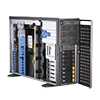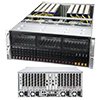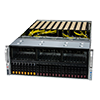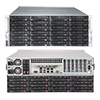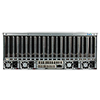4U servers typically have more space for expansion, allowing for the installation of more storage drives, memory modules, and PCIe cards. This makes them suitable for applications that require a high level of scalability and growth potential. With the additional space for hardware components, 4U servers can accommodate higher-end processors, more memory, and more advanced cooling systems. This allows for increased processing power and improved performance for resource-intensive tasks. This can be beneficial for organizations dealing with big data, media storage, and archival purposes. The additional height in a 4U server enclosure allows for improved airflow and cooling options. This helps to mitigate the risk of overheating and ensures optimal performance and reliability. Due to the larger form factor, 4U servers generally provide more accessibility to internal components, making maintenance and upgrades easier. This can reduce downtime and simplify the management of the server. The increased internal space in a 4U server allows for more customization options. Organizations can choose the specific hardware configurations that best meet their needs, ensuring compatibility and maximizing performance.

